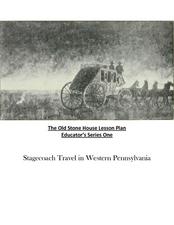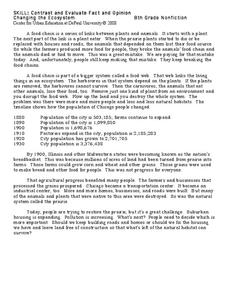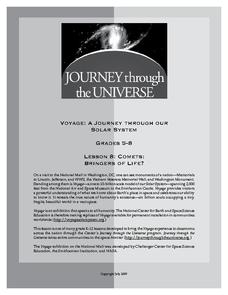K12 Reader
Competing for Resources
Young biologists examine the concept of scarce resources with a reading comprehension passage. After finishing the paragraphs, learners turn to the questions to demonstrate what they have learned about what is beneficial and what is...
K12 Reader
Fungi Are Alive
They are alive even though they are neither plants or animals! Yes, fungi are the subject of this two-part comprehension worksheet. Kids read the article and then use information found there to respond to comprehension...
K12 Reader
Making Predictions
Prediction as a reading comprehension strategy is the focus of an article attached to a two-part learning exercise. Kids read the article and then use the provided information to respond to the comprehension questions.
K12 Reader
Rocky Relationships
Conflicts between Native Americans and colonists are the focus of a comprehension worksheet that asks readers to use information found in the provided article to answer comprehension questions.
K12 Reader
Glossary of Non-Violence
Make sure your class is sure of terminology when referring to the non-violent methods used in the civil rights movement. This glossary includes 19 terms paired with parts of speech and definitions.
Curated OER
Old Stone House Lesson Plan
From stagecoach to railroad tracks, your class will discover how advancements in travel in the United States during the nineteenth century played an integral role in the industrialization and development of American society. The main...
Polar Trec
Foraging for Fish in a Melting Arctic
How much do you know about the black guillemot of the Arctic region? With great background information, images, and a quick discussion, the class will learn all about the plight of the foraging seabird as they play a fun game. First,...
Lincoln Public Schools
Cereal Box Project
Challenge your class with this fun and engaging engineering design project. The goal, to create a brand new cereal complete with a list of ingredients, a name and logo, and a box to hold it in. Starting with a survey to determine the...
iCivics
We the Jury
Learners take on the roles of jurors in a civil case to evaluate evidence and determine a verdict in this engaging online interactive experience.
K12 Reader
Taiga Ecosystems
After reading a short article about taiga ecosystems, middle schoolers are asked to identify the characteristics of this chilly environment.
K12 Reader
Waves and Currents
Waves, currents, crests, and troughs. Using information provided in an article about waves and currents, readers define terms used to describe how energy travels.
DePaul University
Contrast and Evaluate Fact and Opinion
How can you tell when an author is expression an opinion or stating a fact? Use two short reading selections to emphasize the difference between a statement that you can prove and one that you can't. The first passage explains food...
Museum of the Moving Image
Evaluating Information: Focus on the 2008 Election
Just how true is the information contained in political ads? Determining the veracity of campaign ads from the 2008 presidential race is the focus of a lesson that introduces class members to several fact-checking resources.
Journey Through the Universe
Comets: Bringers of Life?
Young scientists investigate the elements found in our solar system and then construct a model of a comet. They apply their new knowledge to the formation of the solar system.
Breaking News English
The Force Awakens Breaks Pre-Sales Ticket Records
May the comprehension skills be with you! Focus on context clues, vocabulary words, and analysis questions with an article about Star Wars: The Force Awakens and its record-breaking ticket sales.
Star Wars in the Classroom
"Shakespeare and Star Wars": Lesson Plan Day 15
To conclude the study of the play, William Shakespeare's Star Wars: Verily, A New Hope, class members craft an in-class essay comparing Doescher's adaptation to George Lucas's film, Star Wars: A New Hope.
National Institute of Open Schooling
Hydrocarbons
The vast majority of hydrocarbons humans use help fuel cars, homes, and provide energy. A comprehensive lesson teaches pupils all about hydrocarbons. From alkanes, alkenes, and alkynes to benzene, classes study the preparation of these...
Constitutional Rights Foundation
Driver’s Licenses And Unauthorized Immigrants
Should driver's licenses be granted to unauthorized immigrants? That is the question class members grapple with in a instructional activity that asks them to first read a fact sheet that details the arguments for and against...
Chicago Botanic Garden
The Carbon Cycle
There is 30 percent more carbon in the atmosphere today than there was 150 years ago. The first lesson in the four-part series teaches classes about the carbon cycle. Over two to three days, classes make a model of the cycle,...
Science 4 Inquiry
Introducing the Types of Energy
Young scientists explore many different types of energy including light, heat, nuclear, sound, potential, and more. They match the types of energy and identify when energy transfers from one type to another.
US Institute of Peace
Defining Conflict
Conflict is everywhere—but is it avoidable? The first activity in a series of 15 peacebuilding lessons examines the nature of conflict at home, school, and across the world. Learners develop a definition of conflict through group work...
Social Media Toolbox
Social Media Roles
Social media has changed the news publishing process, so how does it affect school news publications? Lesson nine in a 16-part series titled The Social Media Toolbox explores the traditional publishing roles through the lens of social...
Facebook
Privacy and You
The stuff I share goes where? Social media scholars discover how sites collect and use metadata during a lesson about privacy and reputation. The activity demonstrates smart privacy settings and promotes good digital citizenship.
Curated OER
The Real World War II
High schoolers work in groups in order to investigate primary and secondary resources in order to make their own conclusions about the history of World War II. They look at the evidence critically looking to find valid resources.























